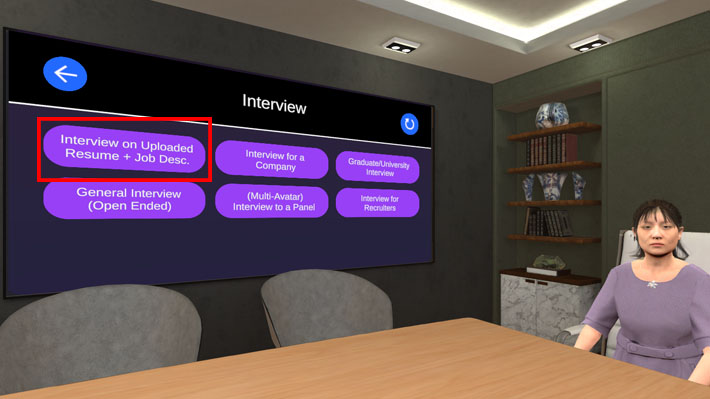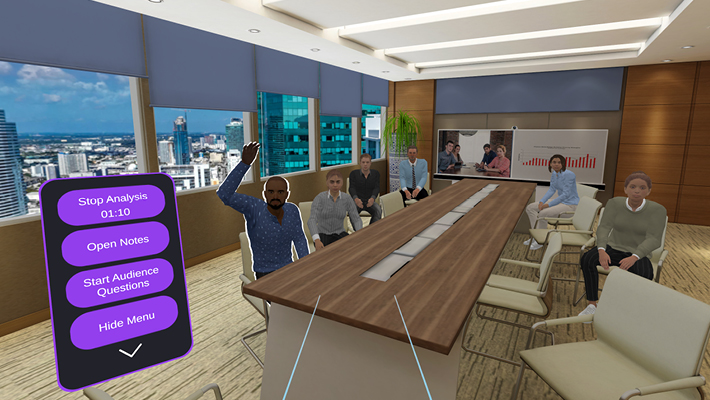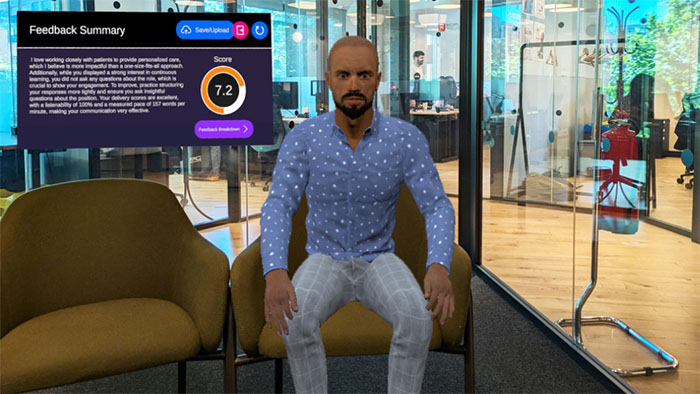From job interviews to negotiating sales, handling audience questions to leading tough disciplinary meetings, the workplace is full of high-pressure situations that challenge our soft skills.
But are we truly prepared to face them? Often, despite the advice and tips we consume, the answer is no.
To master these moments, we need more than knowledge—we need real-world practice and experience. That’s exactly where generative AI and virtual reality step in, revolutionizing how we learn and develop these critical skills.
Practicing in VR with Generative AI
Virtual reality allows us to rehearse for challenging events by placing us in immersive, lifelike scenarios that simulate the pressure and anxiety of real-life situations. This makes practice more engaging and more effective in preparing us for the actual moment.
While VR training for high-stakes fields like medicine or risk-related professions—such as firefighter drills or emergency response—is becoming more commonplace, its use in soft skills training for everyday scenarios like job interviews or difficult conversations is still emerging. The potential to practice handling stressful, real-world situations in a controlled, immersive environment is now available, but it’s less widespread.
By integrating generative AI like ChatGPT into these VR environments, VirtualSpeech has elevated soft skills training to a new level of interactivity. Now, it’s not just about practicing in a 3D space—you can hold dynamic, two-way conversations with AI-driven characters, whether it’s an interviewer, an employee, or a potential client.
This powerful combination of immersive VR and AI-driven roleplay brings an unprecedented level of realism, helping users prepare for tough conversations and professional challenges with confidence.
Example of a VirtualSpeech AI-Driven Roleplay
Benefits of Practicing with ChatGPT in VR
When it comes to practicing soft skills (interview technique, presentation skills, handling difficult conversations, etc), the immersive environment of VR is an invaluable tool. VR allows for the next best thing to experiencing a live audience – yet it’s a safe space that allows for experimentation without fear of failure.
When we add the ability to conduct meaningful two-way conversations, interviews, and interactions (with ChatGPT) to this virtual platform, this training format becomes even more valuable as a tool for gaining real-world skills.
Below are some of the benefits of combining ChatGPT in a VR training platform:
- Enhanced engagement and immersion: ChatGPT functionality can provide users with a more engaging and immersive experience, as they interact with virtual characters that can respond in a human-like way.
- Personalized feedback and coaching: ChatGPT can be used to provide users with personalized feedback and coaching, as it can generate responses based on their actions and decisions.
- Scalability: VR and ChatGPT can be used to train large groups of people in a cost-effective and time-efficient manner, from anywhere in the world
- Accessibility: VR and ChatGPT can be used to provide soft skills training to people with disabilities or those who have difficulty accessing traditional training methods.
- Cost-effective: Using VR with ChatGPT can be less costly than traditional training methods, as it eliminates the need for travel, lodging, and other expenses.
- Access to realistic scenarios: VR and ChatGPT can provide access to realistic scenarios and interactions, which can help users to better understand and prepare for real-life situations by evoking an emotional response to their learning.
- Multiple languages: Roleplay conversations are available in multiple languages including Spanish, French, German, Italian, and Portuguese. This enables users to practice soft skills in various cultural contexts, enhancing their adaptability and global communication skills.
- Custom prompts for personalized experiences: Companies can create custom prompts and scenarios tailored to their specific workforce needs. This personalized approach ensures that employees practice skills relevant to their roles and challenges, maximizing the training’s effectiveness.
- Track progress at scale: Users can save transcripts of their practice sessions, allowing them to review and reflect on previous roleplay conversations. Users can also share their roleplay transcripts with administrators or supervisors for feedback and further guidance. This fosters a collaborative learning environment and helps track individual progress.
Examples of Gen AI Training Use Cases
VirtualSpeech has identified a number of our existing training scenarios where the learning experience can be enhanced with the addition of ChatGPT technology. Below are three examples.
Difficult Conversations: Disappointing Promotion News
Delivering bad news, handling complaints, or resolving conflicts—these are unavoidable parts of leadership in today’s workplace. Imagine having to tell an aggressive employee they’ve been passed over for a promotion. In this type of emotionally charged scenario, staying calm and in control is critical, but it can be difficult to navigate in the heat of the moment.
VirtualSpeech’s roleplay simulation allows you to practice delivering disappointing news in a safe environment, where you can experience how an aggressive employee might react and refine your responses accordingly.
Through these realistic, interactive simulations, you can test different strategies for keeping the conversation productive, handling conflict with poise, and managing your emotions under pressure. The ability to rehearse tough conversations multiple times builds both confidence and competence, preparing you to handle these high-stakes moments more effectively in real life.
Each time you revisit a specific scenario it will play out a little differently.
Job Interview: Answering Questions

Everyone gets nervous about job interviews, yet for an interview to be successful it’s vital to come across calm and confident. With the addition of ChatGPT to VR simulated interview exercises, the most realistic practice is now attainable!
Rather than responding to pre-programmed questions, the VirtualSpeech avatar interviewers now ask personalized questions based on a specific job role or company as well as follow-up questions based on our responses.
After the roleplay, the avatar will provide you with feedback and tips for improvement.
Presentation: Answering Questions

Sometimes the worst part of a presentation is the Q&A – and this is often because it’s the part we can’t easily practice. Well, that is, it’s the part we couldn’t easily practice before the pairing of VR and ChatGPT!
It works like this: You’re in the auditorium, delivering your presentation and handling distractions left, right, and center. All the while, ChatGPT is listening hard and preparing your virtual audience to ask you pertinent questions related to what you have said. You find you’re thinking on your feet just like in the real thing!
As always with VirtualSpeech, you’ll also receive feedback on your speech in terms of tone, pace, eye contact, etc to help you identify your own strengths and weaknesses.
Roleplaying in Multiple Languages
The VirtualSpeech VR platform, integrated with ChatGPT technology, provides a unique and valuable opportunity for learners to engage in roleplaying scenarios across various rooms in multiple languages.
This inclusive feature covers customer service, debating and negotiation, difficult conversations, sales pitching, job interviews, and more. By offering roleplaying experiences in languages such as Spanish, French, Italian, German, and Portuguese, the platform caters to a diverse global audience.
Learners can hone their soft skills in different linguistic contexts, fostering cross-cultural communication skills and adaptability, which are vital in today’s interconnected world.
Real-Time, Personalized Feedback

One of the key advantages of using VR and AI for soft skills training is the ability to receive immediate, actionable feedback. After each practice session, whether you’re rehearsing a job interview or navigating a difficult conversation, VirtualSpeech provides instant feedback on your performance. This could include insights on your body language, tone of voice, word choice, or how effectively you managed the situation.
With this instant evaluation, you can quickly identify areas for improvement and adjust your approach in real-time. This continuous loop of practice and feedback accelerates your learning curve, helping you to refine your skills more efficiently and be better prepared for real-life challenges.
The Future of Generative AI in VR
It’s through practice and experience that we refine our speaking and communication skills. The more realistically we can simulate real-world situations in a virtual environment, the more effective our learning becomes. The powerful combination of immersive virtual reality and advanced generative AI offers highly personalized and engaging training experiences, transforming the way we develop soft skills.
As technology evolves at an unprecedented pace, we’re only scratching the surface of what’s possible. The sophistication of AI-driven VR simulations will continue to grow, offering learners even more realistic, complex scenarios. At VirtualSpeech, we’re constantly exploring new technology to help improve the immersive learning experience, imagining use cases that push the boundaries of what’s achievable.
Not long ago, engaging in a real-time, two-way conversation with an AI avatar that understands your voice and offers personalized feedback seemed far-fetched. Now, it’s reality—and the potential impact of these technologies on our everyday lives is extraordinary. As AI and VR continue to advance, the opportunities for immersive learning will expand, and the future holds even more mind-blowing possibilities.


